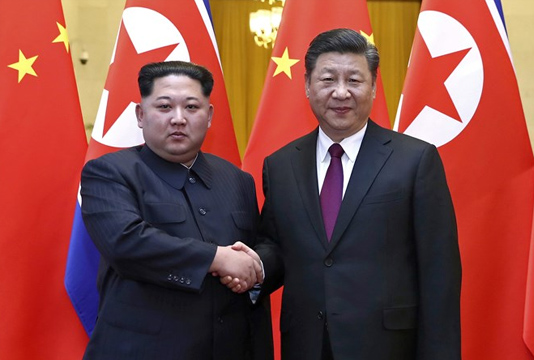BEIJING, June 19, 2018 (BSS/AFP) – North Korean leader Kim Jong Un began a
two-day visit to Beijing Tuesday in what analysts believe is a trip to brief
his sole major ally on his unprecedented summit with US President Donald
Trump and seek consensus on negotiations with Washington.
The outing comes as China has sought to strengthen its role as a mediator
between the US and North Korea, where Beijing claims compelling security and
economic interests.
The North’s leader, who is believed to have landed in the Chinese capital
Tuesday morning, was expected to head to the Great Hall of the People to meet
with Chinese President Xi Jinping, though no official agenda was released.
Dozens of security vans, police cars and armoured vehicles lined streets
around Beijing’s Diaoyutai State Guesthouse — where Kim had stayed in his
previous visit.
A motorcade accompanying a black limousine was seen leaving the compound
late Tuesday afternoon as police cleared the way. A plainclothes officer
grabbed an AFP video journalist and demanded that the footage be deleted.
The visit comes as the United States, which relies on China to enforce
sanctions against Pyongyang, stands on the brink of a potential trade war
with Beijing, adding an extra layer of uncertainty and a possible pressure
point to be exploited by North Korea’s powerful ally.
Chinese state broadcaster CCTV reported that Kim would be in Beijing
through Wednesday.
“We hope this visit will help deepen the China-DPRK relations and
strengthen our strategic communication on major issues to promote regional
peace and stability,” foreign ministry spokesman Geng Shuang told a regular
press briefing.
The visit is the North Korean autocrat’s third to China since March, when
he made his inaugural foreign trip as leader.
Previous trips had been kept secret until Kim returned home. It was not
clear why Chinese state media broke with the precedent.
In addition to discussing last week’s summit, Kim is expected to ask China
for help in easing economic sanctions, in return for his pledge to
denuclearise, according to Wang Dong, an international relations expert at
Peking University.
“The Chinese and North Korean leaders are carrying out consultations on how
to jointly move the Korean nuclear issue forward.”
Following the historic US-North Korea summit in Singapore a week ago, China
suggested the UN Security Council could consider easing the economic
restrictions on its Cold War-era ally.
China may not have been at the table for the historic summit in Singapore
but it retains strong influence behind the scenes, Dong said.
The visit shows that China is “key” to the talks, Wang said.
“It reflects that China is indispensible to the entire Korean nuclear
issue.”
– ‘Differences ahead’ –
In a joint statement following the Singapore summit, Kim pledged to “work
toward the complete denuclearisation of the Korean Peninsula”.
Trump hailed this as a concession but critics said the stock phrase long
used by Pyongyang stopped short of longstanding US demands for North Korea to
give up its atomic arsenal in a “verifiable” and “irreversible” way.
It is now urgent for Xi and Kim to discuss how North Korea will work
towards meeting US demands, said Beijing-based international relations
commentator Hua Po.
“There may be differences ahead between the DPRK and the US in regards to
denuclearisation, because the US wants irreversible and verifiable
denuclearisation. It may be difficult for Kim Jong Un to accept,” Hua told
AFP.
“Therefore, both China and the DPRK want to strengthen communication and
form an overall strategy to deal with the United States going forward,” Hua
added.
– ‘Provocative’ joint exercises halted –
In return for the denuclearisation pledge, Trump made the shock
announcement that he would stop joint military drills with South Korea, long
seen as a provocation by Pyongyang and Beijing.
Analysts saw this as a clear sign of Beijing’s influence.
Beijing has repeatedly called for a “suspension for suspension” approach
where the North would stop its nuclear and missile activities in exchange for
the US and South Korea halting military exercises.
But Washington had previously rebuffed the proposal.
On Tuesday, the US and South Korean militaries confirmed they have called
off scheduled joint exercises following Trump’s order.
Trump had raised eyebrows by describing the exercises as “provocative” — a
term used by the North.



